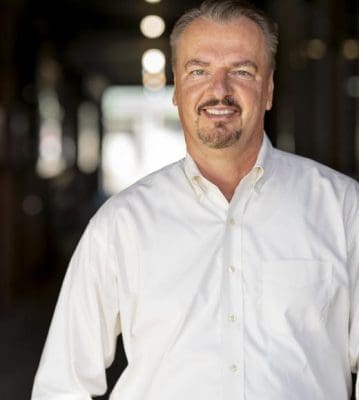Professor Frank Mitloehner has become been a prominent global voice in calls for greenhouse gas emissions from the livestock sector to be reported in scientific perspective and not unfairly overstated.
But, far from suggesting the livestock sector should get a “get-out-of-jail-free” card on the issue, he is also emphatic that livestock producers must own, and not downplay, the emissions their stock do produce.
In an interview with Beef Central this week during his tour down under as a guest of the Australian Dairy Conference, the California-based livestock emissions and air quality scientist said it is important for farmers to commit to their role in reducing emissions.
“I think it is important for farmers to own this topic,” he said.
“It is important for farmers to say ‘we know what our contributions to total emissions are on the greenhouse gas side and we know we are not zero.
“We are producing some and we know our main pollutant is methane.
“There are now certain means as to how we can address that and it is important that farmers say we are committed to playing our role’.
“What will not work in the future is to downplay it and say, ‘oh we are not that big a deal, leave us alone’, that is not going to fly.”
Even if some individual farmers did not believe in the issue of livestock and climate, he said it was important to understand their downstream customers do.
“You are producing for customers and they have raised this topic to the top of their priority list.”
Not your typical influencer
As a clean-cut, middle-aged scientist, Frank Mitloehner might not fit neatly into today’s perception of what it means to be an “influencer”.
But it’s fair to say few other individuals have had greater influence than him in putting evidence-based science at the centre of the international debate around livestock sector emissions, and guiding global livestock industry efforts to reduce emissions.
However, not everyone has been happy to see such work underway.
While it may be easy to assume that research to help the livestock sector curb its emissions would be welcomed, and perhaps even applauded, by those who express concern about greenhouse gases from animal agriculture, some have instead taken the opposite approach and have sought to undermine Dr Mitloehner’s credibility as a scientist.
One such example was a New York Times “hit piece” inspired by Greenpeace last year which”revealed” that his research was partly funded by the agriculture sector – despite the fact he has publicly disclosed that throughout his career.
“Animal scientists work with animal agriculture,” Dr Mitloehner wrote in a blog post responding to the New York Times piece.
“That’s it. That’s the exposé, the conspiracy that so many activists and journalist want to share with you.
“I am transparent about my collaboration with the livestock industry… I engage with the people I’m working to help become more sustainable. It’s no secret – nor should it be.”
Undeterred
Asked in an interview with Beef Central this week if such attacks deterred him, he responded that they had the opposite effect.
“No they don’t deter me at all, in fact they motivate me, and the tell me that I am doing the right thing,” he said.
“Because some extremists and activists feel there is so much need to write whole page articles then I know that I am know that I am on the right side of things.
“I will always continue to work on the sustainability of animal agriculture.
“I will do research, I will publish that research, but I will not limit myself just to publishing, because if that information that we publish doesn’t make its way out into the real world, outside the university bubble and onto our farms, then it is worth next to nothing.
“And so I will never stop and we will never stop and we are greatly motivated to do more.”
More to come – Keep an eye on Beef Central for more stories to follow from his interview this week.


Professor Mitloehner’s work is a step in the right direction but still leaps and bounds from where the industry should be positioned on Biogenic Methane.
The industry is digging its own grave to join in the lie that Biogenic Methane from rainforests, insects, birds or mammals is all of a sudden bad for the environment. A previous article from Beef Central here https://www.beefcentral.com/news/historic-herbivore-herds-on-par-with-today/ states that wild herbivores populations match the current biomass of domesticated animals on earth.
Whilst ever the humanity buys into the con of being able to fix the environment at an atmospheric level we will see continued regression environmentally, socially and economically.
Will the Australian Dairy Conference organisers be told by struggling dairy farmers that inviting guests like the good Dr. Frank is unhelpful in the current economic environment, if not always?
Dr Mitloehner continues to be a wonderful fact finder and advocate on behalf of the livestock industry and it’s management of methane. Each sector within our industry does need to be active in reducing emissions and being open and honest in reporting progress. At the same time though, it also seems reasonable to promote that the global cattle herd has barely changed in 50 years, and that the biomass of ruminant animals may not have changed much in millenia. It helps to frame our industry efforts less around guilt, and more around assisting the planet.